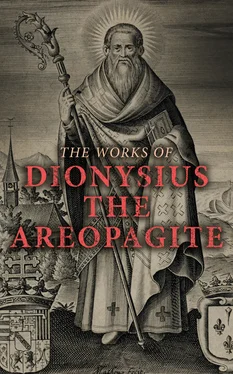SECTION XXXIII.
How, in short, are there evils when there is a Providence? The Evil, qua evil, is not, neither as an actual thing nor as in things existing. And no single thing is without a Providence. For neither is the Evil an actual thing existing unmixed with the Good. And, if no single thing is without participation in the Good, but the lack of the Good is an evil, and no existing thing is deprived absolutely of the Good, the Divine Providence is in all existing things, and no single thing is without Providence. But Providence, as befits Its goodness, uses even evils which happen for the benefit, either individual or general, of themselves or others, and suitably provides for each being. Wherefore we will not admit the vain statement of the multitude, who say that Providence ought to lead us to virtue, even against our will. For to destroy nature is not a function of Providence. Hence, as Providence is conservative of the nature of each, it provides for the free, as free; and for the whole, and individuals, according to the wants of all and each, as far as the nature of those provided for admits the providential benefits of its universal and manifold Providence, distributed proportionably to each.
SECTION XXXIV.
The Evil, then, is not an actual thing, nor is the Evil in things existing. For the Evil, qua evil, is nowhere, and the fact that evil comes into being is not in consequence of power, but by reason of weakness. And, as for the demons, what they are is both from the Good, and good. But their evil is from the declension from their own proper goods, and a change—the weakness, as regards their identity and condition, of the angelic perfection befitting them. And they aspire to the Good, in so far as they aspire to be and to live and to think. And in so far as they do not aspire to the Good, they aspire to the non-existent; and this is not aspiration, but a missing of the true aspiration.
SECTION XXXV.
Now the Oracles call conscious transgressors those who are thoroughly weak as regards the ever memorable knowledge or the practise of the Good, and who, knowing the will, do not perform it,—those who are hearers indeed, but are weak concerning the faith, or the energy of the Good. And for some, it is against their will to understand to do good, by reason of the deviation or weakness of the will. And in short, the Evil (as we have often said) is want of strength and want of power, and defect, either of the knowledge, or the never to be forgotten knowledge, or of the faith, or of the aspiration, or of the energy of the Good. Yet, some one may say, the weakness is not punishable, but on the contrary is pardonable. Now, if the power were not granted, the statement might hold good; but, if power comes from the Good, Who giveth, according to the Oracles, the things suitable to all absolutely, the failure and deviation, and departure and declension of the possession from the Good of our own proper goods is not praiseworthy. But let these things suffice to have been sufficiently said according to our ability in our writings “ Concerning just and Divine chastisement” throughout which sacred treatise the infallibility of the Oracles has cast aside those sophistical statements as senseless words, speaking injustice and falsehood against Almighty God. But now, according to our ability, the Good has been sufficiently praised, as really lovable,—as beginning and end of all—as embracing things existing—as giving form to things not existing—as Cause of all good things—as guiltless of things evil—as Providence and Goodness complete—and soaring above things that are and things that are not—and turning to good things evil, and the privation of Itself—as by all desired, and loved, and esteemed, and whatever else, the true statement, as I deem, has demonstrated in the preceding.
31ευροίας.
32See Dulac, Theology anticipates Science.
33The Greek word is νοητὸν, which in connection with φῶς is rendered here “spiritual light.”
34See Book of Hierotheus, c. 2.
35Angels.
36Creation through Goodness not necessity.
37See note, p. 128.
38i.e. in ascending order.
39Plato, Theaet.
40Theaet., 1763.
41Jahn, p. 66.
42Jahn, p, 67.
43Out of evil forth producing good.
Конец ознакомительного фрагмента.
Текст предоставлен ООО «ЛитРес».
Прочитайте эту книгу целиком, купив полную легальную версию на ЛитРес.
Безопасно оплатить книгу можно банковской картой Visa, MasterCard, Maestro, со счета мобильного телефона, с платежного терминала, в салоне МТС или Связной, через PayPal, WebMoney, Яндекс.Деньги, QIWI Кошелек, бонусными картами или другим удобным Вам способом.












